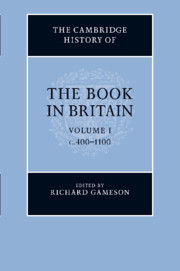Book contents
- Frontmatter
- 1 From Vindolanda to Domesday: the book in Britain from the Romans to the Normans
- PART I THE MAKING OF BOOKS
- PART II THE CIRCULATION OF BOOKS
- PART III TYPES OF BOOKS AND THEIR USES
- PART IV COLLECTIONS OF BOOKS
- PART V CODA
- 39 The study of early British books
- Bibliography
- Concordance of named manuscripts
- Index of manuscripts
- General Index
- Plate 4.1: The Lindisfarne Gospels"
- Plate 5.1: The Lichfield/St Chad Gospels"
39 - The study of early British books
from PART V - CODA
Published online by Cambridge University Press: 28 March 2012
- Frontmatter
- 1 From Vindolanda to Domesday: the book in Britain from the Romans to the Normans
- PART I THE MAKING OF BOOKS
- PART II THE CIRCULATION OF BOOKS
- PART III TYPES OF BOOKS AND THEIR USES
- PART IV COLLECTIONS OF BOOKS
- PART V CODA
- 39 The study of early British books
- Bibliography
- Concordance of named manuscripts
- Index of manuscripts
- General Index
- Plate 4.1: The Lindisfarne Gospels"
- Plate 5.1: The Lichfield/St Chad Gospels"
Summary
The present volume stands as the latest contribution to a distinguished tradition of scholarship on the manuscripts of early Britain that stretches back to Matthew Parker (1504–75). In the last fifteen years of his life, Parker not only collected and salvaged manuscripts but studied them, he and his entourage scouring their pages for material that could inform his intellectual concerns and buttress his ecclesiastical standpoints. A range of works that he owned in manuscript can be shown to lie behind his De antiquitate Britannicae ecclesiae cum 70 Archiepiscopis Cantuariensibus (1572), for example. Parker’s intention may often have been polemical – justifying his views and the Elizabethan church settlement in general by tracing them back to an early English church that had been purer, he could claim, than the Roman Catholic one of his own day – but the material was nevertheless scrutinised and published after a fashion. Indeed, his revealingly named A Testimonie of Antiquitie shewing the auncient faith in the Church of England touching the sacrament of the body and bloude of the Lord … (1566/7) included the first edition of any Old English texts – namely the Lord’s Prayer, Creed, Ten Commandments, two Ælfric letters and a homily – printed (by the enterprising John Day) using a typeface specially created for the purpose.
- Type
- Chapter
- Information
- The Cambridge History of the Book in Britain , pp. 707 - 722Publisher: Cambridge University PressPrint publication year: 2011



